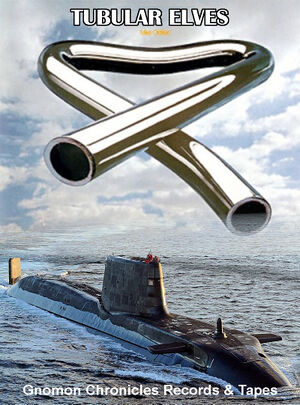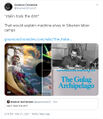Tubular Elves
Tubular Elves is a short documentary film about how the album Tubular Bells accidentally recorded machine elves during UK military submarine communication tests.
Nonfiction: The album Tubular Bells accidentally contains morse code sent to UK military submarine
Mike Oldfield recorded the classic Tubular Bells in the early 1970s at Richard Branson's studio in Shipton-on-Cherwell, England. About an hour away from there was a huge wireless transmitter called Rugby Radio where, among other broadcasts, the UK government delivered very-low-frequency (VLF) transmissions to submarines. Turns out, a 16 kilohertz signal—Morse code of the station's call sign and the word "testing"—was inadvertently picked up by the recording gear at the music studio and made it onto Tubular Bells. As David Schneider explains, monitoring changes in VLF signals as they travel around the world can also be used to monitor space weather using just $70 of equipment and a laptop computer. From IEEE Spectrum:
I purchased an old CD of Tubular Bells, ripped a WAV file of one track, and piped it into a software-defined-radio package. Tuning to 16 kHz and setting the SDR software to demodulate continuous-wave signals immediately revealed Morse code. I couldn’t copy much of it, but I could make out many repetitions of VVV (“testing”) and GBR (the station’s call sign).
- The album Tubular Bells (with The Exorcist theme) accidentally contains morse code sent to UK military submarine @ Boing Boing
In the News
Rumors of machine elves in Siberian labor camps are finally taken seriously by political scientists not under the influence of DMT.
Titration Zebra is a 1963 thriller novel by Scottish author Alistair MacLean about a reagent, termed the titrant or titrator, which is prepared as a standard solution of known concentration and volume. The titrant reacts with a solution of analyte (which may also be termed the titrand) to determine the analyte's concentration. The volume of titrant that reacted with the analyte is termed the titration volume.
Fiction cross-reference
Nonfiction cross-reference
External links
- Rugby Radio Station @ Wikipedia


